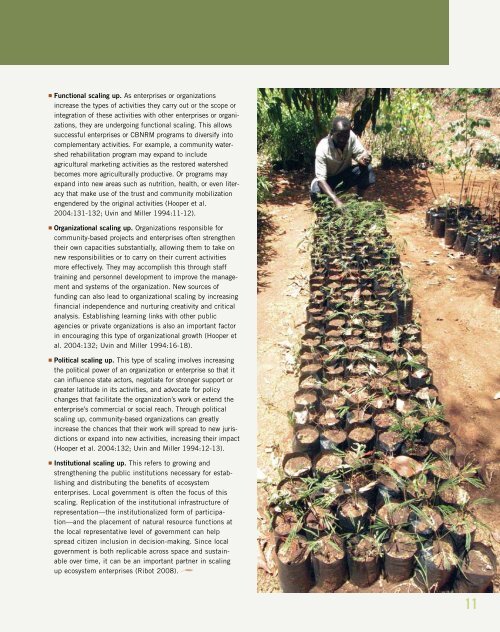Growing the Wealth of the Poor - World Resources Institute
Growing the Wealth of the Poor - World Resources Institute
Growing the Wealth of the Poor - World Resources Institute
You also want an ePaper? Increase the reach of your titles
YUMPU automatically turns print PDFs into web optimized ePapers that Google loves.
■ Functional scaling up. As enterprises or organizationsincrease <strong>the</strong> types <strong>of</strong> activities <strong>the</strong>y carry out or <strong>the</strong> scope orintegration <strong>of</strong> <strong>the</strong>se activities with o<strong>the</strong>r enterprises or organizations,<strong>the</strong>y are undergoing functional scaling. This allowssuccessful enterprises or CBNRM programs to diversify intocomplementary activities. For example, a community watershedrehabilitation program may expand to includeagricultural marketing activities as <strong>the</strong> restored watershedbecomes more agriculturally productive. Or programs mayexpand into new areas such as nutrition, health, or even literacythat make use <strong>of</strong> <strong>the</strong> trust and community mobilizationengendered by <strong>the</strong> original activities (Hooper et al.2004:131-132; Uvin and Miller 1994:11-12).■ Organizational scaling up. Organizations responsible forcommunity-based projects and enterprises <strong>of</strong>ten streng<strong>the</strong>n<strong>the</strong>ir own capacities substantially, allowing <strong>the</strong>m to take onnew responsibilities or to carry on <strong>the</strong>ir current activitiesmore effectively. They may accomplish this through stafftraining and personnel development to improve <strong>the</strong> managementand systems <strong>of</strong> <strong>the</strong> organization. New sources <strong>of</strong>funding can also lead to organizational scaling by increasingfinancial independence and nurturing creativity and criticalanalysis. Establishing learning links with o<strong>the</strong>r publicagencies or private organizations is also an important factorin encouraging this type <strong>of</strong> organizational growth (Hooper etal. 2004:132; Uvin and Miller 1994:16-18).■ Political scaling up. This type <strong>of</strong> scaling involves increasing<strong>the</strong> political power <strong>of</strong> an organization or enterprise so that itcan influence state actors, negotiate for stronger support orgreater latitude in its activities, and advocate for policychanges that facilitate <strong>the</strong> organization’s work or extend <strong>the</strong>enterprise’s commercial or social reach. Through politicalscaling up, community-based organizations can greatlyincrease <strong>the</strong> chances that <strong>the</strong>ir work will spread to new jurisdictionsor expand into new activities, increasing <strong>the</strong>ir impact(Hooper et al. 2004:132; Uvin and Miller 1994:12-13).■ Institutional scaling up. This refers to growing andstreng<strong>the</strong>ning <strong>the</strong> public institutions necessary for establishingand distributing <strong>the</strong> benefits <strong>of</strong> ecosystementerprises. Local government is <strong>of</strong>ten <strong>the</strong> focus <strong>of</strong> thisscaling. Replication <strong>of</strong> <strong>the</strong> institutional infrastructure <strong>of</strong>representation—<strong>the</strong> institutionalized form <strong>of</strong> participation—and<strong>the</strong> placement <strong>of</strong> natural resource functions at<strong>the</strong> local representative level <strong>of</strong> government can helpspread citizen inclusion in decision-making. Since localgovernment is both replicable across space and sustainableover time, it can be an important partner in scalingup ecosystem enterprises (Ribot 2008). 11
















